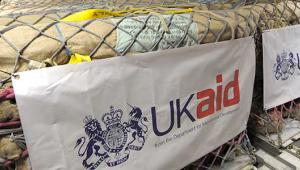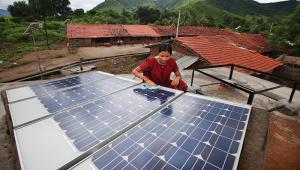By Judith Ugwumadu | 31 October 2014
The UK’s Department of International Development has failed to combat the petty but widespread corruption experienced daily by the world’s poorest people, an aid watchdog has warned.
In a report published today, the Independent Commission for Aid Impact acknowledged that DFID recognised corruption as a critical development challenge as it tried to tackle it through direct and indirect programmes, in countries like Nigeria and Nepal – both of which are fragile states and have been or are affected by internal conflict.
DFID’s indirect anti-corruption work includes: financial and technical support for multilateral anti-corruption initiatives; programmes to improve public financial management systems; and opportunities to build capacity in sectors particularly prone to corruption.
The UK aid department’s more direct measures involved empowering citizens in their ability to challenge petty corruption in health, education, water and sanitation and national power services delivery.
But DIFID provided very little evidence of fighting it, ICAI said. It found during its country visits that there was a widespread acceptance of corruption by the people of these countries, with a ‘democratisation of corruption’ having fully taken hold in Nigeria, and Nepal currently at a tipping point.
As such, ICAI rated DFID’s approach to anti-corruption and its impact on poor people as ‘amber/red’. Programmes had performed ‘relatively poorly’, were not ‘value for money’, and therefore needed ‘significant improvements’.
The report stated: ‘DFID has little understanding of what is working with respect to its anti-corruption activities. Further, DFID does not fully understand which of its activities are addressing corruption or how they will make a difference.
‘It also has not sought sufficient evidence to understand whether its anti-corruption activities are having an impact on the poor. DFID has missed opportunities to use regional anti-corruption advisors to drive the corruption agenda. Strong analysis of specific country contexts regarding corruption has also been lacking.’
The watchdog added that DFID had again failed to provide ICAI with data on the entirety of its spending to tackle corruption, either in terms of programme or staff costs, due to it following the Organisation for Economic Co-operation and Development (OECD) spending rules.
Lead ICAI commissioner Mark Foster said: ‘The UK should take an ambitious stance with respect to tackling corruption around the world as experienced by the poor. We have recommended that DFID should develop an approach to fighting corruption that will be an integral part of the UK government’s wider efforts.
‘DFID, in partnership with Foreign and Commonwealth Office, could be a beacon for anti-corruption internationally.’
In response, a DFID spokeswoman said: ‘ICAI’s report rightly highlights some of DFID’s work which reflects our zero tolerance approach to fraud and corruption. We have anti-corruption and counter fraud plans for each country that we give bilateral aid to.
‘While these plans are tailored to the individual needs of each country, they are based on a common principle that tackles the root causes of corruption by building strong institutions and requiring good governance.
‘Additionally, DFID funds UK police units and crime agencies to investigate the proceeds of corruption by foreign officials through the UK. Internationally, the UK is leading the drive to clamp down on corruption through the G20, World Bank and IMF programmes.’
Under current projections, DFID is expected to spend about £190m on its corruption activities during the years 201/15 to 2017/18. Of this, £71m has already been approved.













